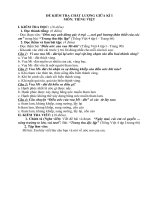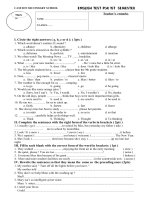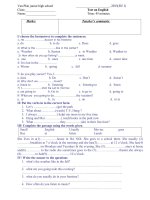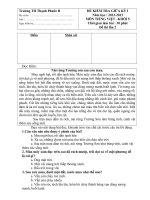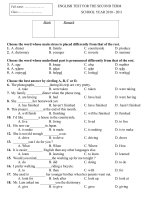- Trang chủ >>
- Sư phạm >>
- Sư phạm sinh
DA va De kiem tra Tieng Anh 123 giua ky I 1718 Tr Nguyen Trai
Bạn đang xem bản rút gọn của tài liệu. Xem và tải ngay bản đầy đủ của tài liệu tại đây (141.57 KB, 6 trang )
SỞ GD & ĐT THÁI BÌNH
TRƯỜNG THPT NGUYỄN
TRÃI
ĐỀ KIỂM TRA GIỮA HỌC KỲ I
NĂM HỌC 2017 - 2018
MÔN: TIẾNG ANH 12
Thời gian làm bài: 60 phút
Mã đề thi 003
Họ, tên thí sinh:..........................................................................
Số báo danh:...............................................................................
I. Mark the letter A, B, C or D on the answersheet to indicate the word whose underlined part
differs from the other three in pronunciation in each of the following sentences.
Question 1: A. hates
B. hurries
C. likes
D. naps
Question 2: A. support
B. pressure
C. discuss
D. pleasure
II. Mark the letter A, B, C, or D on your answer sheet to indicate the word that differs from the
other three in the position of primary stress in each of the following questions.
Question 3: A. attempt
B. support
C. social
D. exchange
Question 4: A. contribute
B. opponent
C. gorilla
D. compliment
III. Mark the letter A, B, C, or D on your answer sheet to indicate the correct answer to each of
the following questions.
Question 5: My mother always warned _______.
A. me not to talk to strangers
B. me not talk to strangers
C. not talking to strangers
D. not to talk to strangers
Question 6:If people paid a little more attention to the environment, the Earth
greener.
A. had been
B. would be
C. will be
D. would have been
Question 7: Students do not have to pay
fees when they attend primary school.
A. teaching
B. education
C. tuition
D. learning
Question 8: She will go abroad as soon as she __________ this English course.
A. has completed
B. will complete
C. completed
D. will have completed
Question 9: Many people have objected to the use of animals in _______ experiments.
A. science
B. scientist
C. scientific
D. scientifically
Question 10: In some Asian countries, love is supposed _______ marriage, not precede it.
A. follow
B. following
C. followed
D. to follow
Question 11: My grandmother takes the _______ for keeping house.
A. ability
B. possibility
C. responsibility
D. probability
Question 12: He has a very bad attitude _______ work.
A. about
B. in
C. with
D. towards
Question 13: We bought some _______.
A. German old lovely glasses
B. lovely old German glasses
C. German lovely old glasses
D. old lovely German glasses
Question 14: If the truck driver hadn't run so fast, the accident __________.
A. would have happened
B. wouldn't happen
C. hadn't happened
D. wouldn't have happened
Question 15: That is the school,
I used to learn.
A. which
B. that
C. at which
D. when
Question 16: I don't think he'll ever _________ the shock of his wife's death.
A. get off
B. get by
C. get through
D. get over
IV. Mark the letter A, B, C, or D on your answer sheet to indicate the underlined part that needs
correction in each of the following questions.
Question 17: After nine years in Rome, Susan and Henry moved to Paris, where they lived happy
ever after.
A. After
B. to
C. where
D. happy
Question 18: Caroline has worn her yellow dress only once since she buys it.
A. has worn
B. yellow
C. once
D. buys
Question 19: New laws should be introduced to reduce the number of traffic in the city center.
A. laws
B. be introduced
C. city center
D. number
V. Mark the letter A, B, C, or D on your answer sheet to indicate the word or phrase that is
CLOSEST in meaning to the underlined part in each of the following questions.
Question 20: School uniform is compulsory in most of Vietnamese schools.
A. depended
B. required
C. divided
D. paid
Question 21: Do you have it down in writing, or was it just a verbal agreement?
A. spoken
B. written
C. formal
D. polite
VI. Mark the letter A, B, C, or D on your answer sheet to indicate the word or phrase that is
OPPOSITE in meaning to the underlined part in each of the questions.
Question 22: Don't pay any attention to Nina - she doesn't know what she's talking about.
A. ignore
B. listen to
C. believe
D. trust
Question 23: Henry has found a temporary job in a factory.
A. permanent
B. satisfactory
C. genuine
D. unstable
VII. Mark the letter A, B, C, or D on your answer sheet to indicate the most suitable response to
complete each of the following exchanges.
Question 24: Ann: “Be quiet! We need to keep our voices down.” - Beck: “_______”
A. Pardon?
B. Excuse me
C. You’re welcome D. Thank you
Question 25: Two friends Mai and Nam are talking to each other.
- Mai: “Make yourself at home!”
- Nam: “_______.”
A. Yes. Can I help you?
B. That is very kind of you. Thank you.
C. Thanks. The same to you.
D. Not at all. Don’t mention it.
VIII. Mark the letter A, B, C, or D on your answer sheet to indicate the sentence that is
CLOSEST in meaning to the sentence given in each of the following questions.
Question 26: ''Where did you go last night''? she said to her boyfriend.
A. She asked her boyfriend where he went the night before.
B. She asked her boyfriend where did he go last night.
C. She asked her boyfriend where he had gone the night before.
D. She asked her boyfriend where had he gone the night before.
Question 27: WannaCry Virus attacked my computer because I clicked on a strange link.
A. But for my click on a strange link, WannaCry virus would attack my computer.
B. Had I clicked on a strange link, WannaCry wouldn't have attacked my computer.
C. If I hadn't clicked in a strange link, WannaCry Virus wouldn't have attacked my computer.
D. If it hadn't been for my click on a strange link, WannaCry virus wouldn't attack my computer.
Question 28: Although my parents are busy at work, they try to find time for their children.
A. My parents are so busy at work that they cannot find time for their children.
B. Busy at work as my parents are, they try to find time for their children.
C. My parents are too busy at work to find time for their children.
D. My friends rarely have time for their children because they are busy at work
IX. Mark the letter A, B, C, or D on your answer sheet to indicate the sentence that best
combines each pair of sentences in the following sentences.
Question 29: He was suspected of having stolen credit cards. The police have investigated him for
days.
A. Suspected of having stolen credit cards, he has been investigated for days.
B. Suspecting of having stolen credit cards, he has been investigated for days.
C. Not being suspected of having stolen credit cards, he has been investigated for days.
D. Having suspected of having stolen credit cards, he has been investigated for days.
Question 30: It was an interesting novel. I stayed up all night to finish it.
A. Though it was an interesting novel, I stayed up all night to finish it.
B. I stayed up all night to finish the novel so it was interesting.
C. Unless it were an interesting novel, I would not stay up all night to finish it.
D. The novel was so interesting that I stayed up all night to finish it.
X. Read the following passage and mark the letter A, B, C, or D on your answer sheet to choose
the word or phrase that best fits each of the numbered blanks.
One of the most difficult decisions is choosing what to do for a living .For example, do you
want to follow a definite career, and (31) _______ a low salary at the beginning, but have good
prospects in a company that trains its staff ? Or are you more interested in taking any kind of
work, because you need an income? You may have to (32) ________ the fact that a good job can
be difficult to find .In that case, why not take a temporary one? You will gain some useful (33)
_______ .Remember that even if you have the right (34) ________, you may have to fill in lots of
application forms before you are asked to (35) ________ an interview. But don’t worry if you
don’t know what you want to do exactly. You’ll enjoy finding out!
Question 31: A. win
B. gain
C. earn
D. take
Question 32: A. go over
B. call off
C. face up to
D. come with up
Question 33: A. experiencing B. experience
C. experiences
D. experienced
Question 34: A. letters
B. degrees
C. exams
D. qualifications
Question 35: A. attend
B.be
C. make
D. advertise
XI. Read the following passage and mark the letter A, B, C or D on your answer sheet to
indicate the correct answer to each of the following questions from 36 to 42.
Dear Editor,
I read with interest the article on American families. In general I agree with it, but there are
some important things it left out. It didn't tell the reader much about the life of a househusband. It's
not an easy life. I know, because I’m now a househusband myself. A househusband has to change
many of his ideas and his ways.
First of all, he has to change the way he thinks about time. Before I was a househusband, I
worked full-time for the New York Times. I was a reporter, and time was always important. We
had to finish our article quickly and give them to the editor. Everyone was always in a hurry. This
is the way, many other men work, too. Businessmen, lawyers, bankers and doctors all have to work
quickly.
At home it's different. The househusband cannot be in a hurry all the time. If you rush
around, you will make everyone unhappy! The children will be unhappy because they don't
understand. For them, time is not important. Your wife will be unhappy because the children are
unhappy. You will be unhappy, too, because they are all unhappy. So you have to learn to slow
down. That is the first and most important rule for a househusband.
There is something else the househusband must learn. You must learn to show how you feel
about things. At work, men usually do not talk about feelings. If they do, people think they are
strange. So, many men are not used to telling anyone about their feelings. They do not know how
to talk about their anger, worries, or love. But children need to know how you feel. They need to
know how much you love them. If you are angry, they need to know why. Your wife also needs to
know about your feelings. If you do not say anything, your family may get the wrong idea. Then
there may be serious problems.
People talk a lot about househusbands these days. Usually they talk about men doing the
housework, the cooking, cleaning, and shopping. But in my opinion, these are the easiest things to
learn. It was much harder for me to change the way I think and the way I act with my family. I
think, other men will also find this harder, but, like me, will find it necessary if they want to have a
happy family!
Ted Diamond
Hartwell, New Jersey
Question 36: What is the article mainly about?
A. life as a househusband
B. fathers and children
C. ideas about time
D. American families
Question 37: At work, most people _______.
A. take their time
B. have lots of time
C. have to slow down
D. have to hurry
Question 38: The word “rush” in paragraph 3 is closet in meaning to _______.
A. move about very slowly
B. spend time idly
C. move about hurriedly
D. shout loudly and angrily
Question 39: What does the househusband have to learn?
A. to do things more quickly
B. to do things more slowly
C. the importance of time
D. how to understand his work
Question 40: According to the passage, children _______.
A. are usually unhappy
B. are always in a hurry
C. usually don’t think time is important D. don’t know how to show their feelings
Question 41: What does the word “they” in paragraph 4 refer to?
A. men who talk about feelings
B. strange people at work
C. men as househusbands
D. men who do not talk about feelings
Question 42: Family problems can happen if _______.
A. men don't talk enough with their families
B. men get wrong ideas
C. men talk too much with their families
D. people talk about househusbands
XII. Read the following passage and mark the letter A, B, C or D on your answer sheet to
indicate the correct answer to each of the following questions from 43 to 50.
Psychologists have debated a long time about whether a child’s upbringing can give it the
ability to do outstandingly well. Some think that it is impossible to develop genius and say that
it is simply something a person is born with. Others, however, argue that the potential for
great achievement can be developed. The truth lies somewhere between these two extremes.
It seems very obvious that being born with the right qualities from gifted parents will
increase a child's ability to do well. However, this ability will be fully realized only with the right
upbringing and opportunities. As one psychologist says, 'To have a fast car, you need both a
good engine and fuel'.
Scientists have recently assessed intelligence, achievement, and ability in 50 sets of
identical twins that were separated shortly after birth and brought up by different parents. They
found that achievement was based on intelligence, and later influenced by the child’s
environment.
One case involving very intelligent twins was quoted. One of the twins received a normal
upbringing, and performed well. The other twin, however, was brought up by extremely
supportive parents and given every possible opportunity to develop its abilities. That twin,
though starting out with the same degree of intelligence as the other, performed even better.
This case reflects the general principle of intelligence and ability. The more favorable the
environment, the more a child’s intelligence and ability are developed. However, there is no link
between intelligence and the socioeconomic level of a child’s family. In other words, it does not
matter how poor or how rich a family is, as this does not affect intelligence.
Gifted people cannot be created by supportive parents, but they can be developed by them.
One professor of music said that outstanding musicians usually started two or three years
earlier than ordinary performers, often because their parents had recognized their ability.
These musicians then needed at least ten years of hard work and training in order to reach the
level they were capable of attaining.
People who want to have very gifted children are given the following advice:
1. Marry an intelligent person.
2. Allow children to follow their own interests rather than the interests of the parents.
3. Start a child's education early but avoid pushing the child too hard.
4. Encourage children to play; for example, playing with musical instruments is essential for
a child who wants to become an outstanding musician.
Question 43: The upbringing of highly intelligent children requires _______.
A. an expensive education
B. good musical instruments
C. parental support and encouragement
D. wealthy and loving parents
Question 44: The word “others” used in the first paragraph refers to_____.
A. other people
B. other scientists
C. other children
D. other geniuses
Question 45: How were great musicians different from ordinary musicians in their development?
A. Their ability was realized at an early stage and then nurtured.
B. They practice playing their instruments for many years.
C. They concentrated on music to the exclusion of other areas.
D. They were exceptionally intelligent and artistic.
Question 46: The writer advises that gifted children should be allowed to follow _____.
A. their own interests
B. their parent's interests
C. only their interests in musical instruments
D. only their interests in computer games
Question 47: When encouraging their gifted children, parents should avoid ______.
A. pushing their children too hard.
B. letting them play their own way
C. permitting them to follow their own interests
D. starting their education at an early age
Question 48: The remark: “To have a fast car, you need both a good engine and fuel.” in the
passage means that in order to become a genius.
A. you need to have good health and good nourishment
B. you need intelligence and you need to develop it
C. you should try to move quickly and efficiently
D. you must nourish your brain and train your muscles hard
Question 49: The word “favorable” in the passage mostly means _______.
A. 'good for someone and making him/her likely to be successful'
B. 'helping somebody to be more intelligent compared to other people'
C. 'of high quality or an acceptable standard'
D. “under the control or in the power of somebody else”
Question 50: All of the following statements are true EXCEPT___________.
A. educational development depends completely on economic well-being
B. a child's intelligence is influenced by that of his/ her parents
C. to become successful, a child needs both native intelligence and development
D. studying different twins is a useful scientific procedure
----------- HẾT ----------
